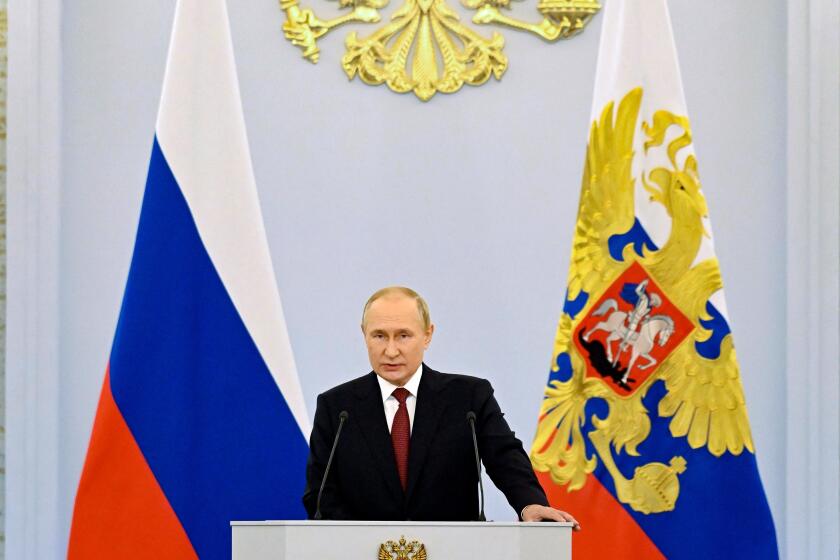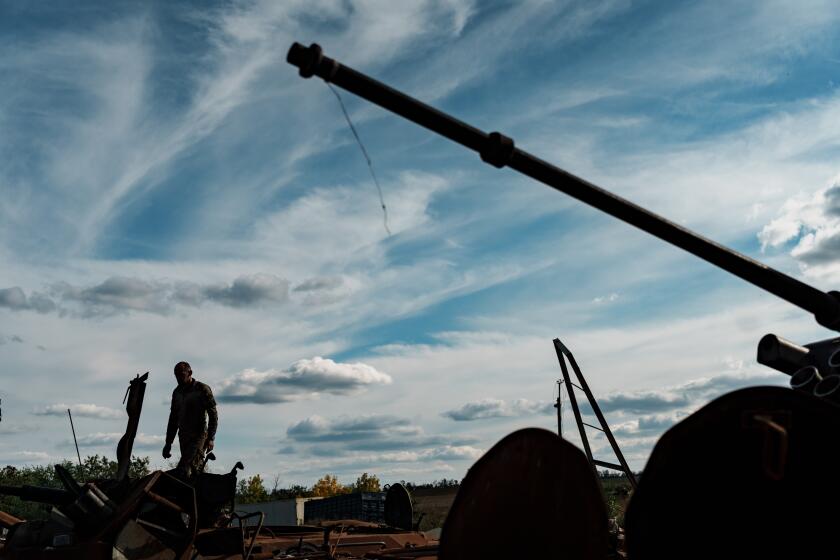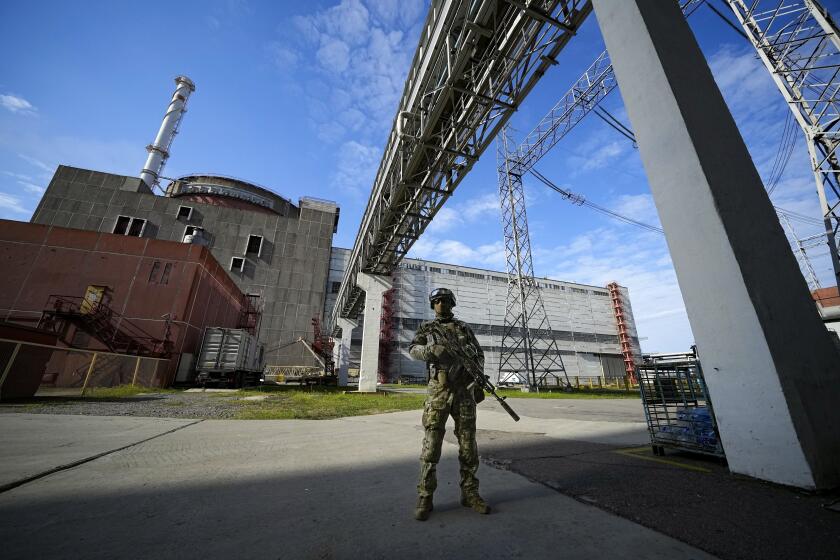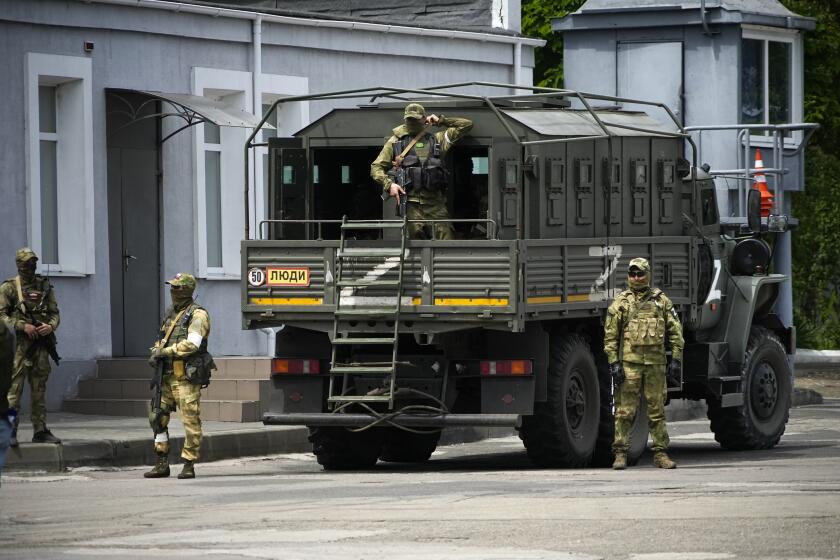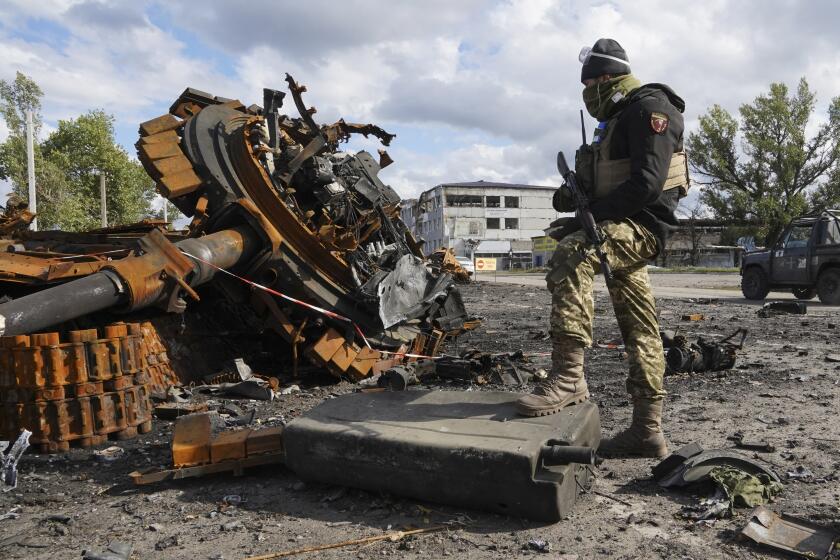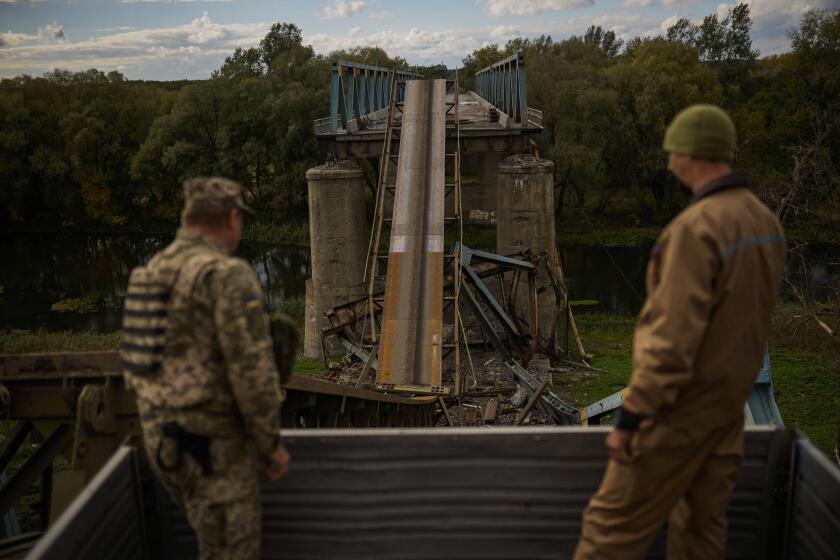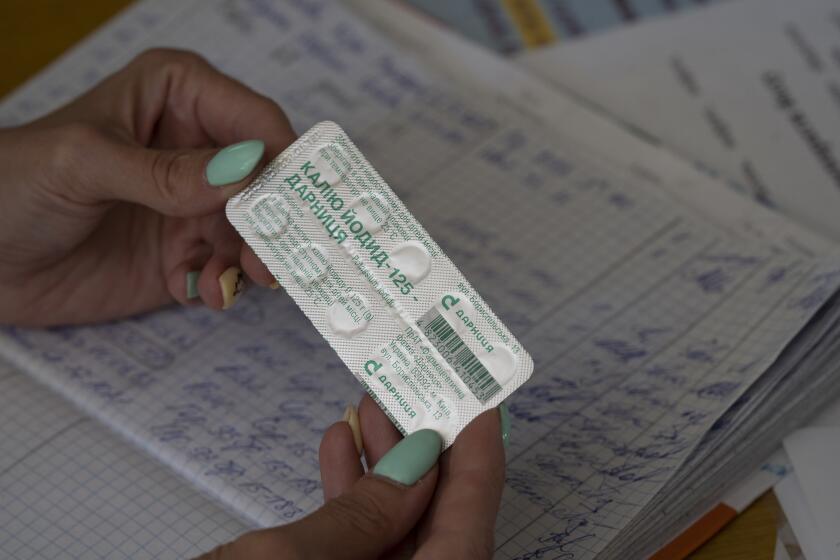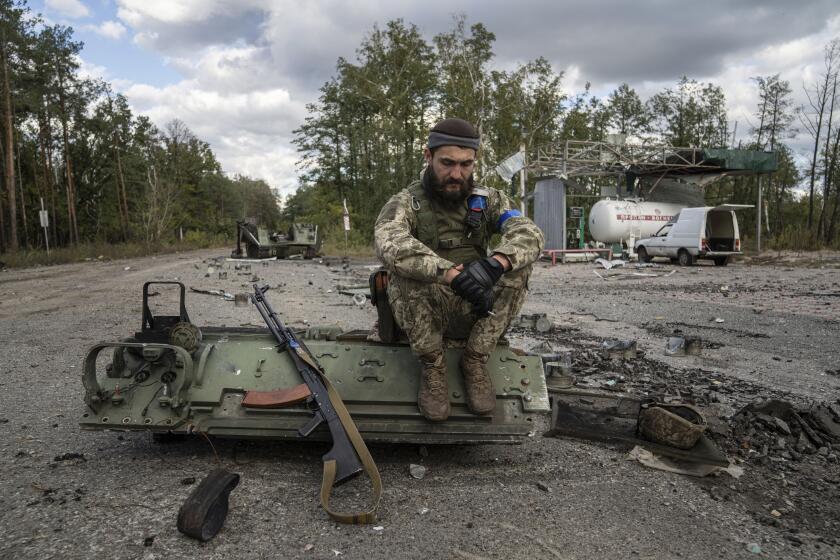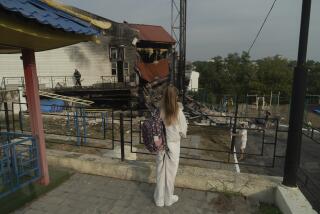Putin says Russian military call-up to finish in 2 weeks as Ukraine makes advances
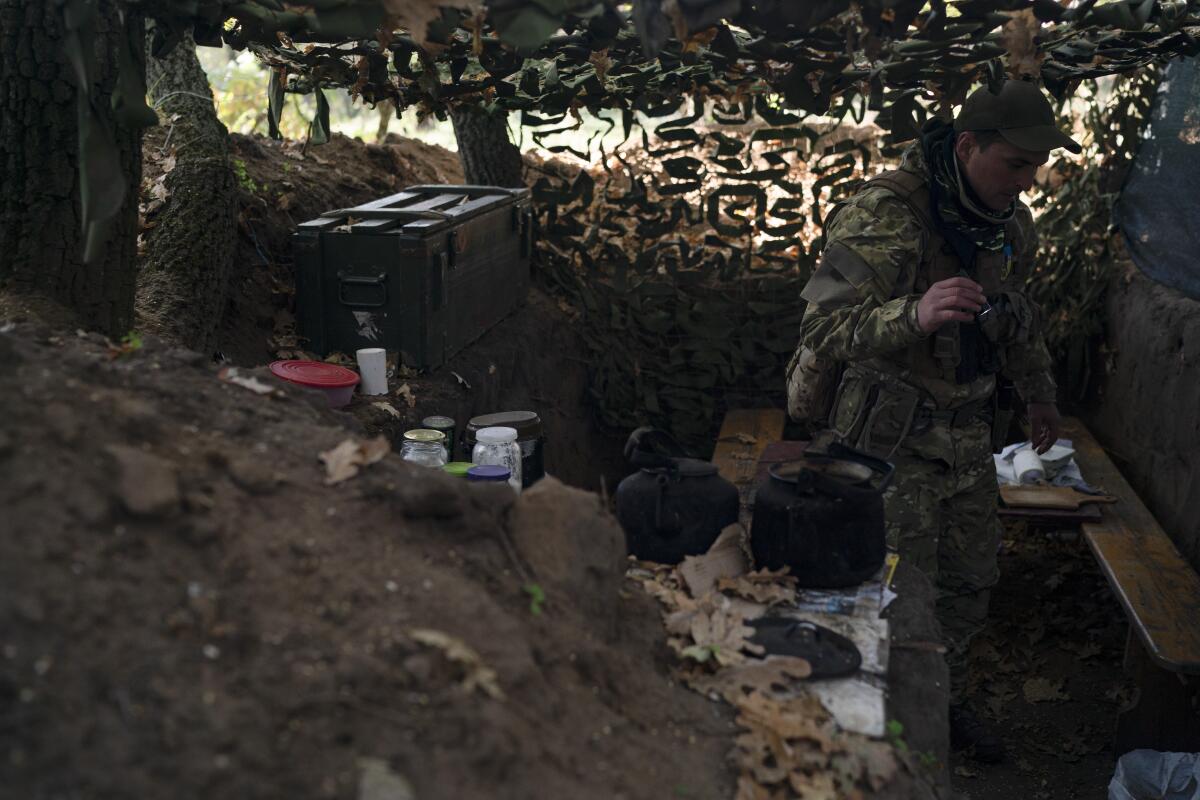
- Share via
KYIV, Ukraine — Russian President Vladimir Putin said Friday that he expects a mobilization of army reservists, ordered by him last month to bolster his country’s troops in Ukraine, will be completed in two weeks.
Putin told reporters after attending a summit in Kazakhstan that 222,000 of the 300,000 reservists that the Russian Defense Ministry said would get called up have been mobilized. He said 33,000 are already in military units and 16,000 are involved in combat.
The call-up has proved hugely unpopular in Russia, where almost all men under the age of 65 are registered as reservists. At the same time, the Kremlin has faced domestic criticism of its handling of the war, increasing pressure on Putin to do more to turn the tide in Russia’s favor.
Despite Putin and other top officials stating that the mobilization would affect some 300,000 people, the decree he signed to get the draft going did not mention a specific number. Russian media reports have suggested that the actual number could be as high as 1.2 million reservists.
Kremlin spokesman Dmitry Peskov has implied that a classified clause of the decree contained the number of people the authorities intend to be mobilized, among other details.
Putin initially described the mobilization as “partial” and said only those with combat or service experience would be drafted. However, Russian media reports have described attempts to round up men without the relevant experience, including those ineligible for service for medical reasons.
Russia’s Vladimir Putin is threatening to use nuclear weapons in his war on Ukraine. The U.S. response need not be nuclear in return.
In the wake of Putin’s order, tens of thousands of men left Russia. Reports have surfaced since then of recruits getting deployed to the front lines in Ukraine with little training and inadequate equipment.
Several mobilized reservists were reported to have died in combat in Ukraine this week, several days after they were drafted.
Putin said that all activated recruits should receive adequate training and that he would assign Russia’s Security Council “to conduct an inspection of how mobilized citizens are being trained.”
Putin also said Friday that there was no need for more widespread attacks against Ukraine, such as those Russia launched Monday in retaliation for a truck bomb explosion Saturday on a prized bridge linking Russia to Crimea, which Moscow seized from Ukraine in 2014.
Rights groups say Moscow’s practice of transporting captured Ukrainian civilians to Russia is illegal under international law. Hundreds, perhaps thousands, have vanished from Russian-occupied areas.
The Kerch Bridge explosion followed Ukraine’s recapturing of occupied areas in the country’s east and south in continuing counteroffensives that have restored Ukrainian confidence and embarrassed Russia’s military.
Russia has promised free accommodation to residents of Ukraine’s partially occupied Kherson region who want to evacuate to Russia, a sign that Ukrainian military gains along the war’s southern front are worrying the Kremlin.
The Moscow-installed leader of Kherson, one of four regions illegally annexed by Putin last month, asked the Kremlin to organize an evacuation from four cities, citing incessant shelling by Ukrainian forces.
Vladimir Saldo, the head of the Moscow-appointed regional administration, said a decision was made to evacuate Kherson residents to the Russian regions of Rostov, Krasnodar and Stavropol, as well as to the Crimean peninsula, which Moscow annexed from Ukraine in 2014.
For the second time in five days, Europe’s biggest nuclear plant lost all external power, but it was restored about eight hours later.
“We, residents of the Kherson region, of course know that Russia doesn’t abandon its own, and Russia always offers a hand,” Saldo said Thursday.
Russia has characterized the movement of Ukrainians to Russia or Russian-controlled territory as voluntary, but in many cases those are the only evacuation routes residents of the occupied areas can or are allowed to take.
Reports have surfaced that some Ukrainians were forcibly deported to “filtration camps” with harsh conditions. In addition, there are reports that Russian officials deported thousands of Ukrainian children — some orphaned, others living with foster families or in institutions — to be raised as Russian.
The evacuation announcement came as Ukrainian forces push their counteroffensive deeper into the southern Kherson region, albeit at a slower pace. Ukrainian forces reported retaking 75 settlements in the Kherson region in the last month, the Ministry for Reintegration of Temporarily Occupied Territories said late Thursday night.
Residents who have left the occupied Black Sea port city of Kherson tell of heavy-handed efforts by Russia to establish permanent control.
A similar campaign in eastern Ukraine resulted in 502 settlements in the Kharkiv region, 43 in the Donetsk region and seven in the Luhansk region returning to Ukrainian control, the ministry said.
Putin illegally annexed Kherson, as well as the neighboring Zaporizhzhia region and the Donetsk and Luhansk regions of eastern Ukraine, last month following “referendums” in the four regions that Kyiv and the West denounced as a sham.
Gen. Valeriy Zaluzhny, the commander of Ukraine’s armed forces, vowed Friday that his forces would succeed in “getting ours back.”
“No one and nothing will stop us,” Zaluzhny said in a video message. “We have buried the myth of the invincibility of the Russian army.”
As Russia’s military performance weakens, a notorious mercenary group, long part of the Ukraine fight, steps into spotlight.
While reiterating calls for local residents to evacuate to Russia, Saldo’s deputy, Kirill Stremousov, also insisted that the evacuation preparations did not mean that the Russian-installed officials anticipated Ukrainian forces taking all of the Kherson region.
“No one’s retreating. ... No one is planning to leave the territory of the Kherson region,” he said.
For a fifth day, Russia continued missile strikes on critical infrastructure that started Monday in retaliation for the explosion on the Moscow-funded bridge that links Crimea to the Russian mainland.
In the last 24 hours, at least nine civilians were killed and 15 were wounded, the Ukrainian president’s office reported Friday morning. The victims included seven people who died after a missile strike in the city of Mykolaiv, where a residential building was destroyed, regional Gov. Vitaliy Kim said.
Russian state-run media outlets that typically enthuse about Moscow’s war in Ukraine sang a different tune after the loss of a key Ukrainian city.
Russian forces on Friday carried out at least four missile strikes on Kharkiv, Ukraine’s second- largest city. Mayor Igor Terekhov reported several explosions in the northeastern city without offering any details on the extent of the damage or saying whether there were any casualties.
The Ukrainian army recaptured most previously occupied areas of the Kharkiv region, which includes the city of the same name, during a fierce counteroffensive last month that forced Russian troops to withdraw and inflicted a stunning blow to Moscow’s military prestige.
The region’s governor, Oleh Sinegubov, urged residents not to ignore air-raid sirens and to get to bomb shelters. Earlier Russian strikes Thursday night cut off the electricity in the regional capital, which had a prewar population of 1.4 million.
Multiple Russian missile strikes shook the city of Zaporizhzhia overnight. The capital of the annexed region remains in Ukrainian hands and has come under repeated bombardment as Ukraine pushes its southern counteroffensive.
The war in Ukraine has heightened fears about nuclear exposure — and interest in iodine pills that can help protect the body from some radiation.
Several explosions were reported overnight at infrastructure facilities, causing fires, regional Gov. Oleksandr Starukh said. There were no victims in preliminary reports, and further details about specific damage were unavailable.
Starukh told Ukrainian state television that Russian soldiers remained unable to enter the city, but their “missiles remind us of the evil and grief that the army of the occupiers carries.”
In addition to the missile strikes on the regional capital, there was also shelling in three cities closer to the Zaporizhzhia nuclear power plant. In Nikopol, Marhanets and Chervonohryhorivka, drone and artillery strikes destroyed residential buildings and damaged water supply and power lines.
The regional capital is about 100 miles from the plant, the largest nuclear power facility in Europe. Two days ago, the plant was forced to revert to diesel-fueled generator power to maintain its reactor cooling systems after an attack on a substation.
Breaking News
Get breaking news, investigations, analysis and more signature journalism from the Los Angeles Times in your inbox.
You may occasionally receive promotional content from the Los Angeles Times.
Friday is Defender’s Day in Ukraine, but celebrations were muted because of the war. In Kyiv, a concert at the central opera house was canceled because of planned rotating power outages across the city as repairs to its energy infrastructure continue following Russia’s wide-ranging missile attacks.
Missile, drone and rocket attacks on Ukraine have kept the country on edge with air-raid sirens sounding more frequently and bringing a heightened sense of urgency after Monday’s strikes killed 19 and wounded more than 100, including many in Kyiv.
Putin has vowed to retaliate harshly if Ukraine or its allies strike Russian territory, including the annexed regions of Ukraine. Russian officials reported Friday that Ukrainian shelling blew up an ammunition depot in Russia’s Belgorod region, on the border with Ukraine.
An unspecified number of people were killed and wounded in the incident, according to Russia’s Investigative Committee. Unconfirmed media reports said three Russian National Guard officers were killed and more than 10 were wounded.
Bodies of Russian soldiers lie in the streets of Lyman after their comrades’ retreat from the city, the latest in a series of setbacks for Moscow.
The Kerch Bridge explosion temporarily halted rail and road traffic on the 12-mile-long span, undermining a vital supply route for the Kremlin’s forces. The Russian government said Friday that repairs were scheduled to be completed by July 2023.
Also on Friday, a court in Simferopol, the second-largest city in Crimea, formally arrested and placed five suspects in pretrial detention in connection with the explosion, according to the Russian news agency Interfax.
Russia’s Federal Security Service said Wednesday that it had identified 12 suspects involved in the explosion. The FSB reported the involvement of Ukrainian, Armenian and Russian citizens in what it described as a “terrorist act”.
More to Read
Sign up for Essential California
The most important California stories and recommendations in your inbox every morning.
You may occasionally receive promotional content from the Los Angeles Times.
